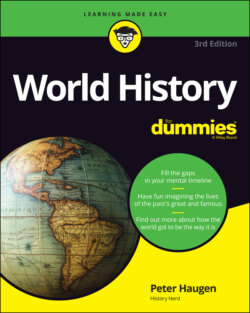Читать книгу World History For Dummies - Peter Haugen - Страница 88
Crossing the Rubicon
ОглавлениеGaius Julius Caesar (better known as Julius Caesar) was a Roman aristocrat and military commander. His far-flung conquests extended Rome’s growing dominion, and he was ambitious for himself as well as for his country.
In the first century BC, Rome desperately needed leadership. Decades of uneasy peace, fierce political rivalries, and widespread bitterness had followed a series of civil wars. Quarreling politicians fighting for power rendered the Roman Senate useless. In 60 BC, three leaders formed the First Triumvirate (rule by three) to restore order. The Triumvirate was an unofficial arrangement and kept secret at first, but it dominated Roman politics for most of a decade. The three co-rulers were Marcus Licinius Crassus; Gnaeus Pompeius Magnus (widely remembered as Pompey); and Julius Caesar, the youngest. Caesar was especially feared by politicians who opposed the Triumvirate, in part because he was a nephew of the late Gaius Marius, who had served seven times as consul, the top administrative post in the Roman government. (A consul was a bit like a combination prime minister and attorney general.)
Caesar’s victories in the Gallic Wars (58–50 BC) pushed the empire’s borders all the way to Europe’s Atlantic seaboard. He also led Rome’s first incursion into Britain in 55 BC. (The Iron Age tribes he encountered there are remembered as Britons, ancestors of today’s Welsh, Scottish and Irish.) While Caesar was away, Crassus died, and the First Triumvirate fell apart. Pompey sought to consolidate his own power, standing as Caesar’s rival instead of his ally.
Returning home in 49 BC, Caesar started another civil war by defying a law that said Roman troops had to stay north of the Rubicon River, in today’s northern Italy. The law was intended to prevent a military leader from taking over the republic by force. Caesar led his troops across the stream and fought other Roman leaders for the prize of absolute power in battles that continued until 45 BC. (Rubicon has meant point of no return ever since.) His rivals defeated, Caesar took the title Dictator for Life.
Caesar wasn’t technically an emperor, but his reign marked the end of the Roman Republic and the beginning of the age of emperors. Rome’s ruling families didn’t take this change lightly. The dictator liked elaborate compliments and formal tributes, making his enemies think he was aiming for not just regal status, but also a kind of imperial divinity. Many Romans were upset by what Caesar was doing to their republic, and they still talked about how the Roman Senate had kicked out Tarquinius Superbus, the last Roman king. Two senators, Brutus and Cassius, plotted Caesar’s assassination and carried it out successfully.
England’s William Shakespeare wrote a terrific play on the subject of Caesar’s downfall 1,600 years after it happened. If you’ve ever said “Beware the Ides of March” or “Friends, Romans, countrymen, lend me your ears,” you’ve quoted Shakespeare’s Julius Caesar. Director Joseph L. Mankiewicz made a movie version of the play in 1953, starring 1950s screen sensation Marlon Brando holding his own alongside Shakespearean heavyweight John Gielgud. It’s not as much fun as a top-flight stage production of the play, but the movie could be a lot worse.
Many more years of civil war followed Caesar’s assassination. Caesar’s cousin and general, Marcus Antonius (Mark Antony), was in position to emerge with supreme power. But Antony’s formidable rival, Caesar’s great-nephew and adopted son, Octavian, came out on top in 31 BC with a win over the combined forces of Antony and his partner (romantic and political), the Egyptian Queen Cleopatra, at Actium off the coast of Greece.
